| Listing 1 - 10 of 22 | << page >> |
Sort by
|
Book
ISBN: 0816012652 0816027633 0816027641 Year: 1991 Publisher: New York Facts on File
Abstract | Keywords | Export | Availability | Bookmark
 Loading...
Loading...Choose an application
- Reference Manager
- EndNote
- RefWorks (Direct export to RefWorks)
Book
ISBN: 0801851939 Year: 1996 Publisher: Baltimore ; London Johns Hopkins University Press
Abstract | Keywords | Export | Availability | Bookmark
 Loading...
Loading...Choose an application
- Reference Manager
- EndNote
- RefWorks (Direct export to RefWorks)
Poetry --- Comparative literature --- Literary rhetorics --- Closure (Rhetoric) --- Conclusion (Rhétorique) --- Endings (Rhetoric) --- Last lines (Rhetoric) --- Peroratie --- Peroration --- Poetics --- Poétique --- Poëtica --- Péroration --- Slot (Retoriek) --- Poetics. --- Closure (Rhetoric).
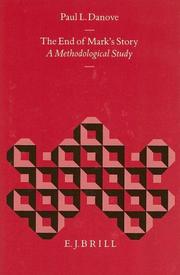
ISBN: 9004097171 9004497501 Year: 1993 Volume: 3 Publisher: Leiden ; New York Brill
Abstract | Keywords | Export | Availability | Bookmark
 Loading...
Loading...Choose an application
- Reference Manager
- EndNote
- RefWorks (Direct export to RefWorks)
Bible NT. Gospels. Mark --- Closure (Rhetoric) in the Bible --- Bible --- Criticism, interpretation, etc --- 226.3 --- Closure (Rhetoric) --- Rhetoric in the Bible --- Endings (Rhetoric) --- Last lines (Rhetoric) --- Peroration --- Rhetoric --- Evangelie volgens Marcus --- Bible. --- Criticism, interpretation, etc.
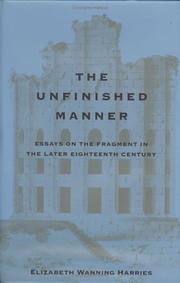
ISBN: 0813915023 Year: 1994 Publisher: Charlottesville London University Press of Virginia
Abstract | Keywords | Export | Availability | Bookmark
 Loading...
Loading...Choose an application
- Reference Manager
- EndNote
- RefWorks (Direct export to RefWorks)
Comparative literature --- Literary rhetorics --- anno 1700-1799 --- Closure (Rhetoric) --- Conclusion (Rhétorique) --- Endings (Rhetoric) --- Last lines (Rhetoric) --- Peroratie --- Peroration --- Péroration --- Slot (Retoriek) --- Literature, Modern --- History and criticism. --- Closure (Rhetoric). --- History and criticism --- Literature [Modern ] --- 18th century --- Literature, Modern - 18th century - History and criticism.
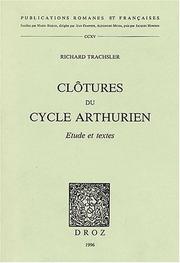
ISBN: 2600001549 9782600001540 Year: 1996 Volume: 215 Publisher: Genève: Droz,
Abstract | Keywords | Export | Availability | Bookmark
 Loading...
Loading...Choose an application
- Reference Manager
- EndNote
- RefWorks (Direct export to RefWorks)
Arthur [Cycle d' ] --- Arthurian romances --- Arthurromans --- Cycle arthurien --- Cycle d'Arthur --- Cycle de la Table ronde --- Romans arthuriens --- Romans bretons --- Romans de la Table ronde --- Table ronde [Romans de la ] --- Knights and knighthood in literature --- Closure (Rhetoric) --- History and criticism --- 82-39 --- -Closure (Rhetoric) --- Endings (Rhetoric) --- Last lines (Rhetoric) --- Peroration --- Rhetoric --- Romances --- Graallegende; Arthurroman --- 82-39 Graallegende; Arthurroman --- Arthurian romances - History and criticism
Book
ISBN: 9783825367626 3825367622 3825377180 9783825377182 Year: 2017 Volume: 154 Publisher: Heildelberg: Universitätsverlag Winter,
Abstract | Keywords | Export | Availability | Bookmark
 Loading...
Loading...Choose an application
- Reference Manager
- EndNote
- RefWorks (Direct export to RefWorks)
Das antike und nachantike Epos bietet sich aufgrund seiner diachronen Ausprägung und narrativen Großform in besonderer Weise für eine vergleichende Untersuchung über Anfänge und Enden an, und zwar unter makro-/mikrostrukturellen und thematischen Aspekten. Narrative Modellierungen epischer Bauformen, die sich mit Anfang und Ende beschäftigen, werden in den hier vorgelegten Beiträgen ebenso behandelt wie das (bisweilen als nicht wirklich abgeschlossen empfundene) Finale und seine Fortsetzungen in Form von Korrekturen oder auch Ergänzungen. Anfangend mit den homerischen Epen über das hellenistische (Klein-)Epos und das lateinische Epos augusteischer, neronischer, flavischer und spätantiker Zeit enden die Fallbeispiele mit neulateinischen Epen. Im Fokus der Untersuchungen steht die Frage, welche Potentiale die dynamische Gattung des Epos in der Modellierung von Anfängen und Enden als markanten Punkten innerhalb einer größeren narrativen Struktur entfaltet.
Epic poetry, Greek --- Epic poetry, Latin --- Poésie épique grecque --- Poésie épique latine --- History and criticism --- Histoire et critique --- Poésie épique grecque --- Poésie épique latine --- Closure (Rhetoric) --- Closure (Rhetoric). --- Epic literature --- Epic literature. --- Epic poetry, Classical --- Epic poetry, Classical. --- Epic poetry, Latin (Medieval and modern) --- Epic poetry, Latin (Medieval and modern). --- Epos. --- Erzähltechnik. --- Erzähltheorie. --- Griechisch. --- Latein. --- Openings (Rhetoric) --- Openings (Rhetoric).
Book
ISBN: 9782812401787 2812401788 Year: 2010 Volume: 2 Publisher: Paris Classiques Garnier
Abstract | Keywords | Export | Availability | Bookmark
 Loading...
Loading...Choose an application
- Reference Manager
- EndNote
- RefWorks (Direct export to RefWorks)
"L'articulation des frontières de l'œuvre constitue une question cruciale, dont les enjeux ont rarement été abordés dans le champ critique. Les essais présentés dans ce livre analysent comment le récit construit son sens par le rapprochement et la confrontation de son début et de sa fin. Les entretiens inédits avec trois écrivains contemporains montrent que les frontières du texte jouent un rôle décisif dans le parcours de création, et nous font entrer au cœur de la fabrique du roman, là où l'écriture définit ses propres limites."--
Fiction --- Openings (Rhetoric) --- Closure (Rhetoric) --- Creation (Literary, artistic, etc.) --- Ouverture (Rhétorique) --- Conclusion (Littérature) --- Création (Arts) --- Roman --- History and criticism. --- Histoire et critique --- Ouverture (Rhétorique) --- Conclusion (Littérature) --- Création (Arts)
Book
ISSN: 09280731 ISBN: 9789004218222 9789004221307 9004221301 1283395940 9786613395948 900421822X Year: 2012 Volume: 111 Publisher: Leiden: Brill,
Abstract | Keywords | Export | Availability | Bookmark
 Loading...
Loading...Choose an application
- Reference Manager
- EndNote
- RefWorks (Direct export to RefWorks)
There has been much discussion of narrative aspects of the Bible in recent years, but the ends of biblical narratives – how the ends contribute to closure for their stories and how the ending strategies affect the whole narrative – have not been studied comprehensively. This study shows how the writers and editors of short narratives in Genesis gave their stories a sense of closure (or in a few cases, the sense of non-closure). Multiple and sometimes unexpected, forms of closure are identified; together these form a set of closural conventions. This contribution to narrative poetics of the Hebrew Bible in the light of source criticism will also be valuable to those who are interested in narrative and in concepts of closure.
Closure (Rhetoric) in the Bible. --- Bible. --- Criticism, Narrative. --- 221.015 --- Oud Testament: literaire kritiek; authenticiteit; bronnenstudie; Formgeschiche; Traditionsgeschichte; Redaktionsgeschichte --- Be-reshit (Book of the Old Testament) --- Bereshit (Book of the Old Testament) --- Bytie (Book of the Old Testament) --- Chʻangsegi (Book of the Old Testament) --- Genesis (Book of the Old Testament) --- Sifr al-Takwīn --- Takwīn (Book of the Old Testament) --- 221.015 Oud Testament: literaire kritiek; authenticiteit; bronnenstudie; Formgeschiche; Traditionsgeschichte; Redaktionsgeschichte --- Closure (Rhetoric) in the Bible
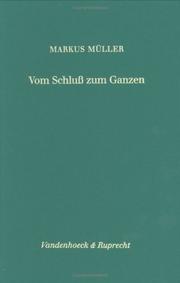
ISBN: 3525538553 9783525538555 Year: 1997 Volume: 172 Publisher: Göttingen: Vandenhoeck und Ruprecht,
Abstract | Keywords | Export | Availability | Bookmark
 Loading...
Loading...Choose an application
- Reference Manager
- EndNote
- RefWorks (Direct export to RefWorks)
Rhetoric in the Bible. --- Closure (Rhetoric) --- 227.1 --- Rhetoric in the Bible --- #GROL:SEMI-22<08> Fors 172 --- #GROL:SEMI-227.08*3 --- Endings (Rhetoric) --- Last lines (Rhetoric) --- Peroration --- Rhetoric --- Brieven van Paulus--(algemeen) --- 227.1 Brieven van Paulus--(algemeen) --- Closure (Rhetoric) in the Bible --- Bible. --- Epistles of Paul --- Paul, Epistles of --- Paul Sŏsin --- Pauline epistles --- Risālat al-Qiddīs Būlus al-rasūl al-thāniyah ilá Tīmūthīʼūs --- Language, style. --- Bible. N.T. Epistles of Paul --- Criticism, interpretation, etc
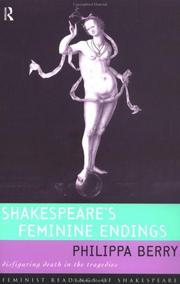
ISBN: 0415068959 Year: 1999 Volume: *1 Publisher: New York London Routledge
Abstract | Keywords | Export | Availability | Bookmark
 Loading...
Loading...Choose an application
- Reference Manager
- EndNote
- RefWorks (Direct export to RefWorks)
Bereavement in literature --- Closure (Rhetoric) --- Conclusion (Rhétorique) --- Death in literature --- Dood in de literatuur --- Endings (Rhetoric) --- Last lines (Rhetoric) --- Mort dans la littérature --- Peroratie --- Peroration --- Péroration --- Rôle selon le sexe dans la littérature --- Seksuele rolpatronen in de literatuur --- Sex role in literature --- Slot (Retoriek) --- Sterfte in de literatuur --- Death in literature. --- Feminism and literature --- Sex role in literature. --- Women and literature --- History --- Closure (Rhetoric). --- Shakespeare, William --- Tragedies --- England --- 16th century --- 17th century --- Characters --- Women --- Shakespeare, William, - 1564-1616 - Tragedies. --- Shakespeare, William, - 1564-1616 - Characters - Women.
| Listing 1 - 10 of 22 | << page >> |
Sort by
|

 Search
Search Feedback
Feedback About UniCat
About UniCat  Help
Help News
News